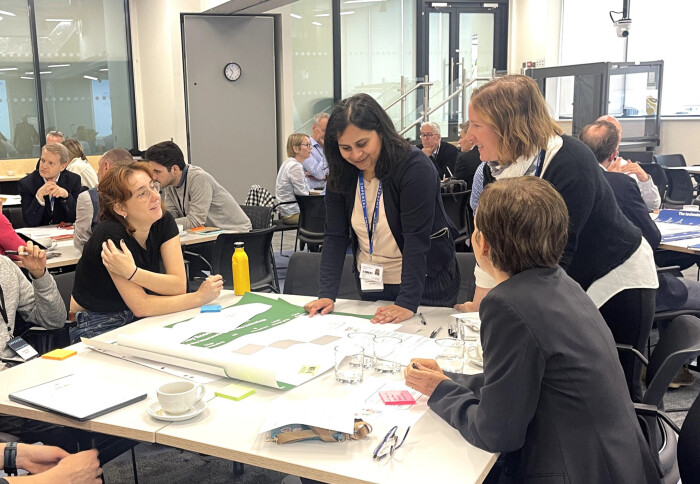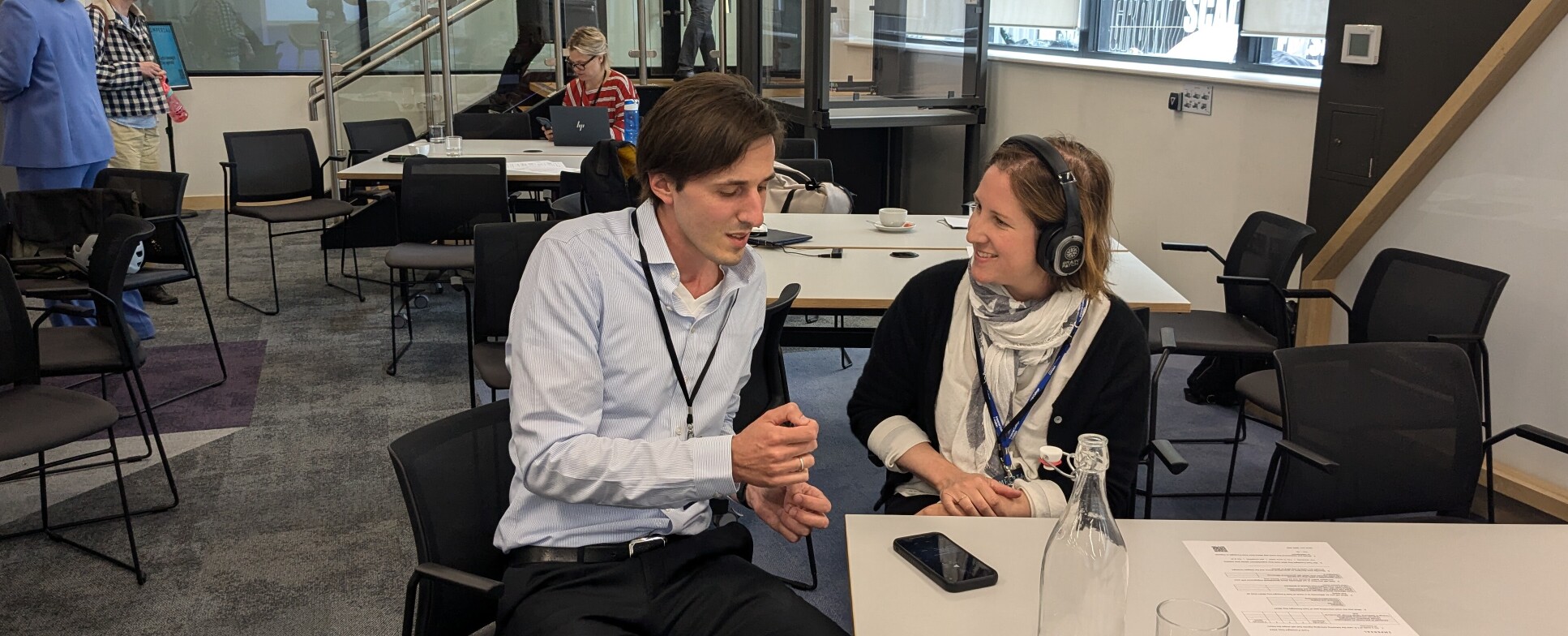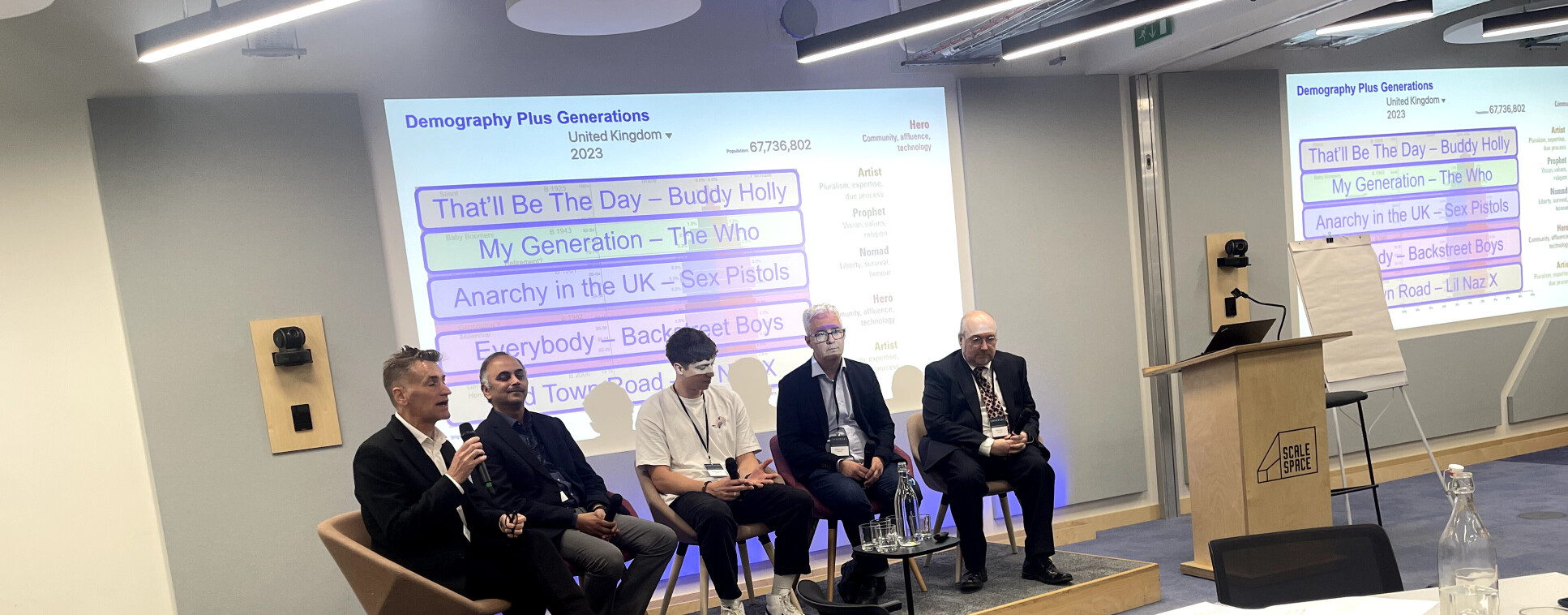Eight things we learned about humans and technology at Tech Foresight Day 2024

The ways different generations interact with technology was the hot topic at Imperial Tech Foresight's latest event.
How is technology shaped by culture – and how will the lives of today’s young people be shaped (or hamstrung) by the design choices made by older generations? Experts from Imperial and its community of entrepreneurs and business partners explored these questions last week in a workshop by Imperial’s future-focused Tech Foresight unit.
Here are eight things we learned about technology, the human, and intergenerational divides:
1. We could talk to the animals
Like Dr Doolittle, we could soon understand what animals are saying and speak back to them using AI translators that can best humans at interpreting animal communications. This was just one futuristic technology discussed by Dr Cristina Banks-Leite from the Department of Life Sciences, who is exploring techniques for tracking biodiversity in all its complexity such as ultra high-resolution satellite imagery, AI-assisted audio monitoring, and mammal DNA gathered by mosquitos. Her research has informed regulation on biodiversity by governments around the world
2. Emojis are fingerprints
The repertoire of emojis that you habitually use can be used not only to tell whether you’re a boomer or a millennial, as demonstrated in an online quiz from CNN, but is potentially enough to pick you out as an individual. This kind of data is often tracked by technology companies and can be used to build up detailed profiles of individuals even from superficially anonymous data sets, according to Professor Hamed Haddadi from the Department of Computing.
3. In the modern world, your TV watches you
Emojis are just one kind of telemetric data that technology companies are pulling not only from phones and computers but from everyday ‘smart’ devices such as fridges, doorbells and TVs which nowadays combine hardware and software with sometimes opaque functionality from multiple suppliers. New regulations in the UK, EU and USA will require manufacturers to introduce new security features and greater transparency around where they send your data – thanks partly to extensive support Professor Haddadi and his group have provided to policymakers.
4. We all need autonomy
Despite generational divides between so-called boomers, millennials, and zoomers, our emotional needs stay constant between generations and cultures, said Professor Rafael Calvo from the Dyson School of Design Engineering. The tricky part is understanding the differing ways these needs are fulfilled. “For people with dementia, surveillance increases safety, which increases autonomy. For teenagers, using social media may support autonomy, even though you can see the negative consequences of that, including the extreme surveillance” he observed.
5. Millennials are heroes
Labels such as baby boomer, Gen X, millennial and Gen Z are widely used not only in popular culture but by businesses to track differences between age cohorts. According to the famous Strauss–Howe theory, each generation fits into one of four archetypes (millennials, for example, fit into the ‘hero’ archetype for their self-reliance and individualism) that repeat cyclically. While the credentials of this theory are disputed, it is noteworthy for its cultural influence – and could be a self-fulfilling prophecy given our tendency to be shaped by the labels used to describe us.
6. Mangoes are not the only fruit
 A team of Imperial students have thought through what a social media network would look like if its algorithms were designed to serve users instead of manipulating them. Their concept, Mango, would give users the agency to decide what they see in their feeds and would also aim to avoid the echo chamber effect. “As much as we love mangoes, to thrive as critical thinkers we need the skills to consider other types of fruits,” said Yasmine Bouri, who was part of the student team alongside Ariane Lucchini, Mattie Ball-Torokoff, Ben Butterworth and Taisiya Sosina that developed the concept as part of an Enterprise Lab Idea Challenge.
A team of Imperial students have thought through what a social media network would look like if its algorithms were designed to serve users instead of manipulating them. Their concept, Mango, would give users the agency to decide what they see in their feeds and would also aim to avoid the echo chamber effect. “As much as we love mangoes, to thrive as critical thinkers we need the skills to consider other types of fruits,” said Yasmine Bouri, who was part of the student team alongside Ariane Lucchini, Mattie Ball-Torokoff, Ben Butterworth and Taisiya Sosina that developed the concept as part of an Enterprise Lab Idea Challenge.
7. Neurotechnology could improve your mood
A device that non-invasively stimulates the brain with a weak electric current could help users concentrate and relax, said Imperial neuroscience alumnus Dr Nickolai Vysokov. “We found a location and a set of protocols that give you direct access to the body’s relaxation system,” he said. “By applying weak current, we can stimulate the vagus nerve, and provide a sensation comparable to mediation. We have turned this into a consumer-friendly headset.” The headphone-like device, which combines neurostimulation with music, is being produced by his company BrainPatch.

8. Foresight is crucial
“Your first phone might have been a Nokia – a Finnish company that started out as a paper mill,” said Emilie Didier, Tech Foresight Executive. “They started doing forecasting, expanded from paper to rubber and electronics, and realised in the 1980s through using foresight that cell phones were going to explode in popularity.”
Nokia, Ms Didier explained, came to dominate the marketplace with their phones. However, it is said that in later years they became complacent and stopped looking into the future or looking at new market entrants. They didn’t realise that what Apple did to revolutionise the cell phone user experience with the iPhone would become the de facto standard.
Imperial’s Foresight Strategy Manager Nick Price, co-hosting the event, said that looking beyond an organisation’s public and private life, foresight is part of a less visible and high impact secret life.

__
Imperial Tech Foresight uses a variety of methods developed in-house to make the future come alive for companies in Imperial Business Partners (IBP) corporate membership programme through bespoke foresight programmes, inspirational thought-leadership pieces and stimulating events. Learn more on the Imperial Tech Foresight website, or contact the IBP team directly.
Article text (excluding photos or graphics) © Imperial College London.
Photos and graphics subject to third party copyright used with permission or © Imperial College London.
Reporter
David Silverman
Communications Division
